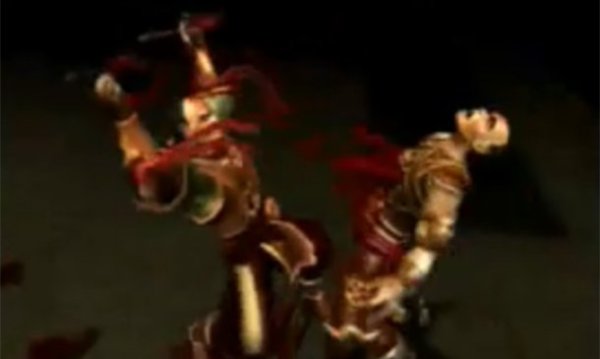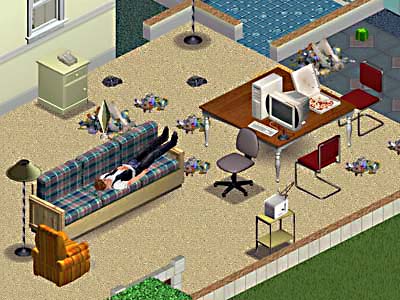For the past week or so, I’ve been running a game called BLOODSPORT that I designed and wrote. In this game, twenty-two men and women are abducted from their beds and dropped into a sandy alien coliseum, where they’re forced to fight to the death for the pleasure of their alien captors. Players spend most of the game training in a chamber deep underground, and directly or indirectly voting one another into the arena. It’s an email-based elimination game and there are now nine players left. Combat, scheming, and permadeath are at the core of the experience. Twenty-two people play but only one person gets to the end. BLOODSPORT has by turns been exhilarating and exhausting, for me and (I gather) for some of the people playing it.
Here’s my biggest mistake—I did a bad job of preparing my players for the time commitment that the game might entail. As such, some of them had trouble keeping up with all of the emails and flavor text. One person became so overwhelmed that they decided to quit.
So I gleefully penned a depressing story about how their character killed himself, here reproduced in full:
“Brian Sachs was sleeping in his bunk. That’s all he’d been doing for the past few days. Everyone else was traipsing around this god-forsaken cave like idiots. Shit, he didn’t want to be here. He’d said it from the first day: he wants to go home. He approached an alien guard and asked him to spear him in the stomach. Brian Sachs has been killed. He will no longer be playing with us.”
I sent this story to everyone playing as a diegetic explanation for Brian dropping out of the game. It was flavor text. Now, I thought that this story was funny for a few reasons. For one, the first thing that I asked each player to do was to send in a name and a catch phrase for their character. Brian Sachs chose “I want to go home” as his catch phrase, and it now seemed all to appropriate. Second, while all of the other players had been doing their training actions each day, the person playing Brian had been too busy to participate, and as such Brian hadn’t done any training. Once this player (understandably) decided to quit, I was left with the image of a sad man who wouldn’t leave the barracks and couldn’t find the strength to go on. And so I had him kill himself!
Immediately, I got a few responses from a few of the other players, saying something to the effect of “hahahahhaha that was great.” But when the player who was playing Brian responded to me, he told me that he was sad that Brian would never make it home to see his wife and kids.
This got me thinking. My friends and I have designed a few other games like this, but none of them have encouraged roleplaying as much as mine has. In those games, we were pretty much playing as ourselves. That, in my opinion, made it too easy to get offended; there was no layer between the player and the player’s persona. So in my game everyone is playing a character, and no one knows who is pulling the strings.
The roleplaying also allowed me to write lots of meaty flavor text that I hoped would make my players move invested in the world and characters that we were creating. In past games, there has been little sadness about being voted out because there was no in-game parallel. Maybe you would cease to be in the game, but it wasn’t like your character was speared in the belly by an alien guard or chopped in half by someone you considered a friend.
In most games, you will eventually win. Sure, you’ll encounter adversity and opponents, but even if you die you’ll just reload and keep going until eventually you become the hero who saves the world, just like you always knew you would be. Even in permadeath games like Nethack or Spelunky, death is only a hurdle before your next iteration of the game. Who hasn’t died hundreds of times in Spelunky?
In BLOODSPORT, there are no save games and there is no new game button. It’s run live over two weeks or so, and 96% of players will die. Half of the players won’t even see the second half of the game. This is a very unfamiliar gaming experience for many. It’s like Survivor or Neptune’s Pride. The players become invested in their character’s life because it’s the only one they have. The victor can feel a true sense of pride because she or he has outsmarted, outplayed, outschemed, or out-RNGed their competitors. It’s not a game for everyone, but it’s certainly a game for some.
When the person playing Brian Sachs quit, though, I was feeling bad that I had misled people into thinking that the game would take less time than it did. I worried that there were people playing who didn’t want to be—who were overwhelmed by the number of emails and the sometimes complicated rule-sets. Quitting was always an option, but I wanted to present an easy in-game out that would let people quit guiltlessly and without just abandoning their characters. My first thought was to give them an easy way to go home, but I thought better of this because all of the characters would probably want to go home. If I offered them the option, they’d have to step out of character to reject it. So I came up with the Rebellion. This email went out to all of the players:
“You’ve heard rumors of an uprising against your alien overlords. Your friend said to you, “I don’t think that it will work, but I sure as hell don’t want to give the aliens the pleasure of seeing me die in the arena. If I’m going down, I’m taking some of those alien bastards down with me…”
I gave each of my twenty remaining players the option to join the rebellion and I made it clear that doing so would result in fun flavor text and the end of their role in BLOODSPORT.
I expected a few people to drop out. Instead I got nineteen encouraging responses. “I’ll take my chances in the arena.” “Screw rebellions.” “No rebellion for me.” “I will not be participating in the rebellion. I will, however, totally sell out the rebels if I can get a reward for my unscrupulous conduct.” All but one player responded to tell me that they wanted to continue playing. Several added that they were having a great time. The final player was simply very busy with work and wasn’t able to keep up with the social game. So I sent out my email on the rebellion (Derrick was one of the game’s NPCs—a paranoid ex-military boot camp instructor who has been trapped deep in the ground for far too long):
“The time is now, ladies and gentlemen,” screams Derrick, a crazy look in his eyes. “Who’s with me?? Viva la revolution!” He draws a beautiful diamond sword and raises it above his head.
“I’m with you!” shouts Roly Poly, and then the room is heavy with silence.
“No one else? Only one will join the revolution?” No response. “Ah, to hell with all of you. We’re dead either way. Come Roly, we have guards to slay!” Roly Poly and Derrick charge off into the black of the cave and they are never seen again.
Roly Poly has died.
A permadeath, long-form game centered around trust and betrayal will never appeal to everyone, especially when it requires a lot of time. But I’m glad that most of the people who are playing are enjoying the ride. Designing and running BLOODSPORT has been a hell of a lot of work, but I suspect that I’m having even more fun than my players.
~
This is the first in a series of articles about BLOODSPORT. In my next one I’ll go into more detail about how the game worked, and what I’ve learned about designing and implementing new mechanics.


























